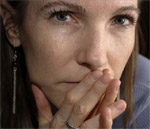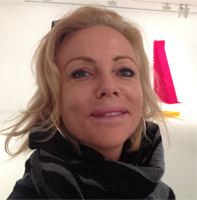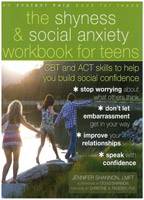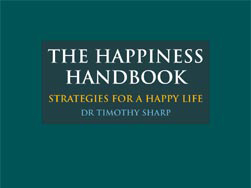Megan McDonough Science of Happiness Interview
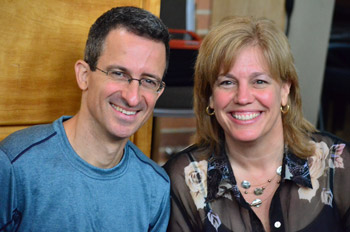
Megan McDonough Science of Happiness Interview
Everyone wants to be happy, but until now the instruction manual was missing. Just as plants follow the sun, people can orient towards the positive by using the latest science to guide actions at home, work, and in relationships.
This quest towards the best is something Megan McDonough has spent decades developing. As CEO and co-founder along with Dr. Tal Ben-Shahar of the highly regarded Wholebeing Institute, McDonough is an award-winning author, US national media source for Fast Company, Yoga Journal, and Woman's Day, and regular contributor to The Huffington Post. The pioneering work she leads at Wholebeing Institute has changed the way Americans think about wellbeing - and she is excited to start this conversation in Australia later this month.
'I want to approach well-being from a broader perspective than the -what's wrong' focus of traditional healthcare that looks solely at pathology, disease and illness. Let's also look at what's working," Mrs McDonough said.
This "what's right" focus is the basis of Positive Psychology--a science that studies individual and societal flourishing, and on cultivating happiness, strengths, self-esteem and optimism. This science forms the foundation of all educational programs at Wholebeing Institute.
'This is an opportunity to transform the discussion about health and wellbeing to include the best possibilities for humanity, not just what needs fixing."
Megan is the author of Infinity in a Box, Using Yoga to Live with Ease, and A Minute for Me, Learning to Savor Sixty Seconds. Her latest pocket guide, Radically Receptive Meditation, is the result of experiencing Recollective Awareness with her teacher Jason Siff. She is a yoga enthusiast, and has practiced over 20 years and taught for more than a decade.
With her degree in biology, natural science, and nuclear medicine, Megan has held leadership positions in healthcare, directed numerous online-learning startups, and speaks across North America for high-profile clients, including the American Cancer Society and the Society of Nuclear Medicine. Megan's down-to-earth teaching style combined with the rigor of science makes learning accessible to beginners and experts alike.
Patti McKone, American Cancer Society describes Megan as a dynamic presenter who has a natural ability to connect with people: 'She is bright, witty and engaging – all of which make her an extremely energetic and motivating speaker."
Megan's guiding ethos has been to build organisations and networks that harness the best in people for the greatest good"and she can't wait to get started in Australia.
Interview with Megan McDonough
Question: What is Positive Psychology?
Megan McDonough: Positive Psychology is the scientific study of thriving"cultivating happiness, strengths, self-esteem, and optimism. While traditional psychology focuses on fixing what's wrong"alleviating neurosis, anxiety, and depression"Positive Psychology focuses on what's right to create a thriving life. By applying evidence-based tools, we learn how to bring about lasting change, cultivate healthy relationships, build affirming emotions and deal with painful ones, and develop positive self-regard and grounded optimism. The foundations of Positive Psychology, and it's application in everyday life, is what's taught in the yearlong Certificate in Positive Psychology program.
Question: Why should we look at including Positive Psychology in our everyday lives?
Megan McDonough: Along with treating ill-being (sickness, depression, disease), we can continually improve our level of well-being. This daily practice orients us to wholebeing (a word that condenses 'whole person" and 'well-being"). We define wholebeing through 5 dimensions of SPIRE:
Physical: Listening to and caring for the body
Intellectual: Creating a life-long love of learning, art, and nature.
Relational: Contributing to and benefiting from community
Emotional: Developing resilience and enjoying positive emotions
Examples of positive psychology interventions include focusing on your strengths, practicing gratitude, and positive journaling. Though simple, the trick is creating habits and rituals that sustain over the long haul. That's why the Certificate in Positive Psychology is a yearlong program, where people work in small groups over a long period of time to encourage and support lasting change.
Question: How can Positive Psychology be used to cure illness?
Megan McDonough: Positive Psychology is not a magic bullet. It is not meant to replace any medical necessities such as surgery or medicine. Rather, it's cultivating a certain mindset that allows us to be resilient when problems arise and savor the good times. This mindset is fundamental in the Certificate in Positive Psychology course, where students practice journaling, mindfulness, appreciation and other tools that build a growth mindset.
Question: How does health, exercise and positive-thinking ensure happiness?
Megan McDonough: Positive Psychology is not positive thinking. Positive Psychology is grounded optimism that orients us to wholebeing. If we have low self esteem, positive thinking (I am happy, great, wonderful, all-is-well thinking, when it's not) can actually make us feel worse. The thought that we 'should" be happy, that happiness is an end-game, is a recipe for disappointment. Rather, we learn to identify constructive states, elevate them, and see the journey as the gem, not some idealised end state of happily-ever-after.
Happiness is a choice that can be trained, cultivated, and chosen. That's the point of the Certificate in Positive Psychology program.
Question: Is part of the issue with depression and anxiety that we feel we should always be happy?
Megan McDonough: It is natural and part of being human to feel the full range of human emotions. Always being happy is impossible. Rather, when we're feeling low, ask yourself 'What can I do today to be 5% happier?" Incremental shifts over time are more sustainable than the black-and-white 'get happy". And if you are experiencing depression, use all the tools at your disposal"from therapy and drugs if needed, to the tools of positive psychology.
Question: What's wrong with the focus of traditional healthcare?
Megan McDonough: Again, nothing is wrong with traditional healthcare. It serves an important and vital function. If you cut your finger accidentally, you would not use the tools of positive psychology to fix it. You would go to the hospital and get stiches, and perhaps bolster your emotional mindset by practicing gratitude for the skills of the doctor, or that the cut was only minor, or that your loved one was there to take you to the emergency room.
Question: What are your top tips for implementing Positive Psychology into our daily lives?
Megan McDonough: There's a deeper understanding of the tools"how and why they work and when to apply them"in the yearlong study of Positive Psychology, but here are some highlights:
Tip 1: Savour the Good. Take time to taste even the simplest of good moments, as you would a sip of fine wine. Amplify and appreciate the good, no matter how small. Be grateful, appreciate this moment.
Tip 2: Love More. Relationships are the number-one predictor of well-being. Practice looking people in the eye, listening to what's being said (and not said), leaning in, and smiling.
Tip 3: Focus on strengths. Using your strengths is enlivening, energising, and feels very natural. Lean on what works.
Tip 4: Move Often. Movement activates and engages the brain and improves your mood, and regular exercise helps foster a positive body image.
Question: What inspired you to look into Positive Psychology?
Megan McDonough: I've been a yoga practitioner for over 20 years, and found Positive Psychology 3 years ago. Both fields have a common vision of well-being, albeit different ways to language the work. It was a natural transition for me when Dr. Tal Ben-Shahar and I started the Wholebeing Institute to bridge yoga, positive psychology, and the traditional healthcare system.
Question: Can you tell us about your books?
Megan McDonough: Sure. I have three books, the latest which is Radically Receptive Meditation. A Minute for Me is short reflections designed to reorient the day in positive way in under 60 seconds. Infinity in a Box uses a simple four-step process to live with more ease and less stress.
Question: What is the Wholebeing Institute?
Megan McDonough: Wholebeing Institute is an educational organisation focused on positive psychology and wellbeing. The foundational course is the Certificate in Positive Psychology, held for the first time ever outside the United States, coming to Australia mid-May in partnership with Geelong Grammar School.
Interview by Brooke Hunter
Have You Seen This?
MORE

